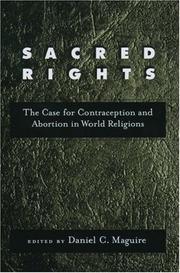| Listing 1 - 2 of 2 |
Sort by
|

ISBN: 0700711546 Year: 2003 Publisher: London ; New York : Routledge,
Abstract | Keywords | Export | Availability | Bookmark
 Loading...
Loading...Choose an application
- Reference Manager
- EndNote
- RefWorks (Direct export to RefWorks)
Analyzes Chinese fertility policies and population developments with particular emphasis on the controversial one-child campaign. The text focuses on Chinese demographic thinking, goals and legal norms, policy-making and implementation, economic aspects, demographic results and popular response.
Birth control --- Contrôle des naissances --- Régulation des naissances --- Government policy --- Economic aspects --- Politique gouvernementale --- Aspect économique --- China --- Chine --- Population policy --- Population --- Politique démographique --- S11/1050 --- S11/1070 --- -Birth control --- -Population control --- Pregnancy --- Family planning --- Contraception --- Reproductive rights --- China: Social sciences--Family planning --- China: Social sciences--One child policy --- -Government policy --- -Prevention --- Population. --- Population policy. --- -China: Social sciences--Family planning --- -China --- Contrôle des naissances --- Régulation des naissances --- Aspect économique --- Politique démographique --- Population control --- Prevention

ISBN: 0195160010 0199849617 128070408X 9786610704088 0195347811 0195160002 9780195160017 Year: 2003 Publisher: Oxford Oxford university press
Abstract | Keywords | Export | Availability | Bookmark
 Loading...
Loading...Choose an application
- Reference Manager
- EndNote
- RefWorks (Direct export to RefWorks)
This title presents the work of the "Sacred Choices Initiative" of the Religious Consultation on Population, Reproductive Health, and Ethics.As the global population continues to grow, family planning is fast becoming one of the most critical issues facing the planet. While many organizations-most prominently the United Nations-are trying to implement policies that will help curb the population explosion, these measures are frequently blocked by those professing conservative religious beliefs.L In many of the world's religions there is a restrictive and pro-natalist view on family planning, and this is one legitimate reading of those religious traditions. As the essays in this volume demonstrate, however, this is not the only legitimate or orthodox view. Seeking to counteract the simplistic idea that all religions are completely antagonistic toward family planning, the authors-all scholar-practitioners of the religions about which they write-present alternative interpretations of religions' views about family planning. Arguing for the existence of equally valid traditions that allow contraception and abortion, they seek to escape the confines of oversimplified either/or, pro-choice/pro-life arguments. Instead, they point the way forward toward a more open discussion of family planning.LDispelling the notion that the world's religions are uniformly conservative on issues of family planning, the authors show that the parameters of orthodoxy are wider and gentler than that, and that the great religious traditions are wiser and more variegated than a simple repetition of the most conservative views would suggest.
Birth control --- Contraception --- Abortion --- Religious aspects --- 291.5 --- 241.633 --- -Contraception --- -Abortion --- -anticonceptie (voorbehoedsmiddelen, contraceptie, geboortecontrole) --- abortus (vrijwillige zwangerschapsafbreking) --- godsdienst (religie, religieuze aspecten) --- Abortion, Induced --- Feticide --- Foeticide --- Induced abortion --- Pregnancy termination --- Termination of pregnancy --- Fetal death --- Obstetrics --- Reproductive rights --- Conception --- Population control --- Pregnancy --- Family planning --- Godsdienstwetenschap: moraal; religieuze wet; zedelijk ideaal; religieuze plichten --- Theologische ethiek: abortus --- contraception (contrôle des naissances) --- avortement (interruption volontaire de grossesse, IVG) --- religion (aspects religieux) --- Surgery --- Prevention --- 241.633 Theologische ethiek: abortus --- 291.5 Godsdienstwetenschap: moraal; religieuze wet; zedelijk ideaal; religieuze plichten --- anticonceptie (voorbehoedsmiddelen, contraceptie, geboortecontrole) --- Moral and religious aspects --- Birth control - Religious aspects --- Contraception - Religious aspects --- Abortion - Religious aspects
| Listing 1 - 2 of 2 |
Sort by
|

 Search
Search Feedback
Feedback About UniCat
About UniCat  Help
Help News
News